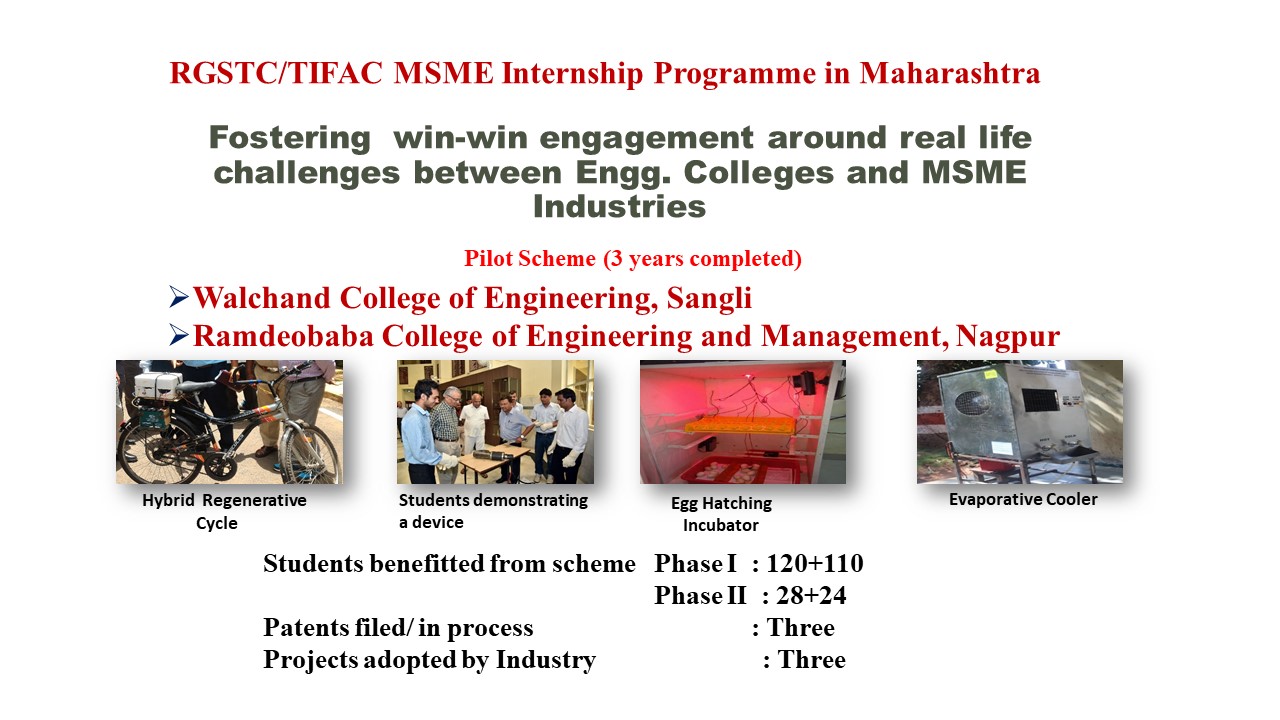Strengthening innovation in MSME industries and Engineering Colleges: Experience with a pilot experiment in Maharashtra
Background
The MSMEs in India have been making a very large contribution to employment and exports. However, in majority of cases, their ability to continuously rejuvenate their technology and remain competitive over long periods has been an issue, primarily due to lack of resources (finance, knowledge, in house capabilities etc.), thin margins and increasing market competition. As such, an opportunity and a bit of financial support to innovate, leveraging vast human resource pool of students and faculty of engineering colleges in the neighborhood could become a very valuable input for them to continuously upgrade their technology and products.
On the other hand, for students of engineering colleges who are anyway expected to do a project in an industry as a part of their curriculum, a hands-on real-life problem-solving opportunity under the joint mentorship of industry as well as faculty, can make a significant difference to their learning process and shape them into an innovative engineer. At present, most of the time, such projects are more in the nature of exposure to industry and lack real-life problem-solving experience, that is crucial to shaping students into competent and confident engineers. Quality improvement of engineers coming out of our engineering colleges, in terms of their real-life problem-solving capability is a major challenge that needs to be addressed.
Both, the students and their faculty on one side and the industry particularly in the neighborhood on the other, thus need to be a part of a common eco system that inculcates and nurtures a spirit of innovation for mutual benefit. This potential win-win situation is the need of the hour for both the industry and the engineering colleges. TIFAC, an autonomous institution under DST, Govt. of India, as well as RGSTC, an S&T Commission under Govt. of Maharashtra, have therefore experimented with pilot schemes over last 3 years and have successfully proven this concept.
Under the scheme, students are expected to be spending time at the industry in two stages over a cumulative period of eight months. In the First stage of two months duration, third-year students (primarily during their vacation period) work under the mentorship of industry and their faculty, to identify technical problems/challenges that the industry would want to be solved with the support of this scheme. A total of 30 students are supported from a college (15 groups of 2 students each, each group working with an industry to identify a problem). The total estimated cost during the first stage is Rs. 4.32 lakhs for one engineering college. In the Second stage of six months duration while the students are now in their fourth year, a maximum of 3 projects are selected (by a technical screening committee consisting of independent members from academia and industry) from among 15 projects identified in the first stage for actual resolution and implementation at the industry. The total estimated cost for one selected project would be Rs. 2.95 lakhs. The estimated costs include honorarium to the faculty working as a Scheme Coordinator, Travel cost, Institute Overheads and Contingency. For the projects selected for implementation, there is also a provision for development cost involving instrumentation, materials, fabrication, field trials etc.
The scheme has been successfully implemented by TIFAC in five selected engineering colleges in the country. In addition, RGSTC has been successfully operating this scheme at two engineering colleges in Maharashtra. The experience has been very encouraging. Scaling up this scheme to all engineering colleges in the country could produce rich dividends both in terms of better engineers coming out of our engineering colleges and a much-needed technical support to our MSME industries. The total expenditure involved for each engineering college is approximately Rs. 13.50 lakhs during one year. Assuming that there are around 3500 engineering colleges in the country and if one decides to progressively bring all of them into this fold, it would correspond to an outlay of under 500 crores which is quite small compared to the benefits the scheme would produce.
A snapshot of result of past three years’ RGSTC experience with this scheme in Maharashtra is depicted in the figure below:

